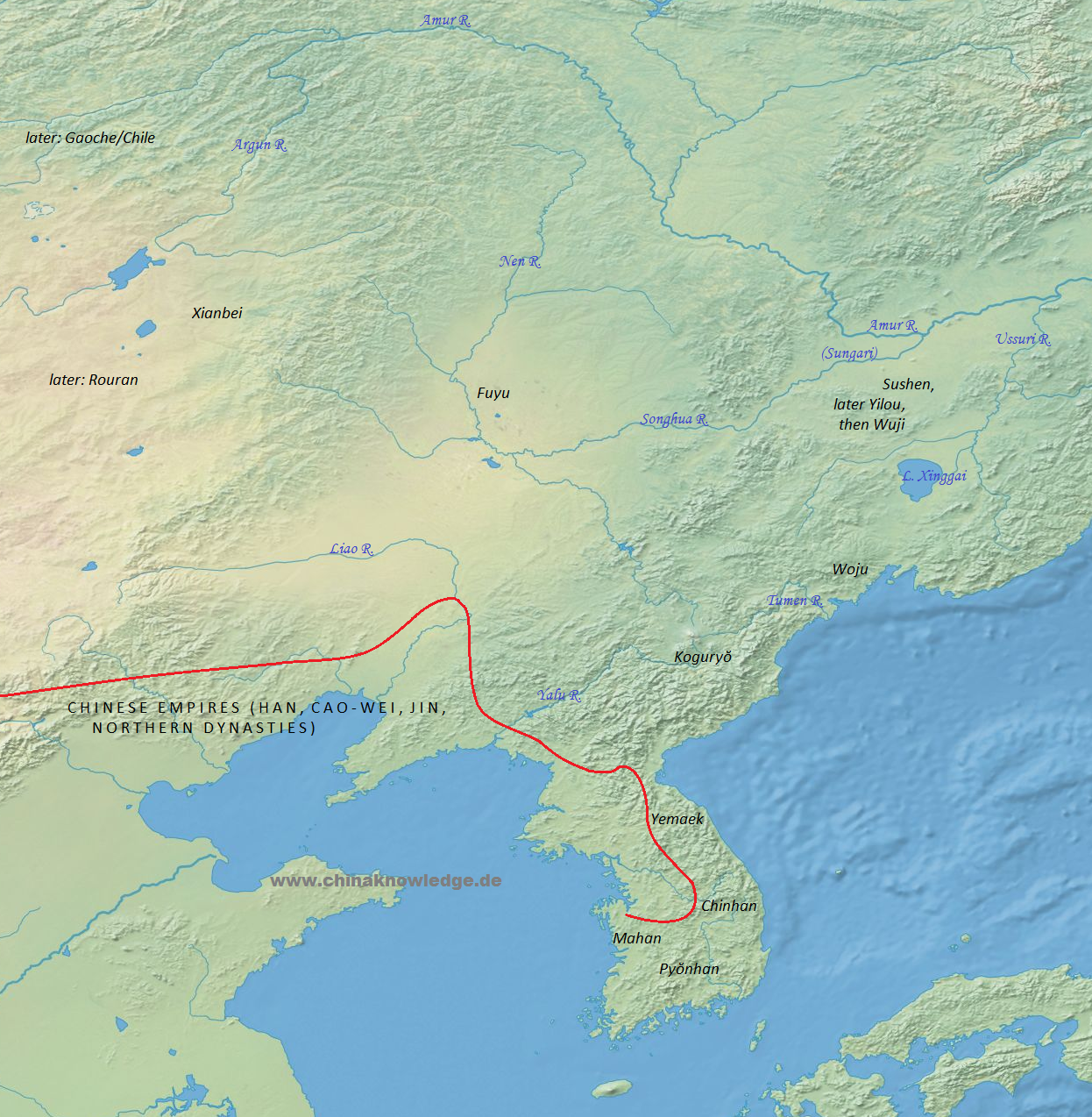Fuyu 夫余 (also written 扶余, Korean reading Puyŏ) was a state in the northeastern region, in the northern parts of modern North Korea. It was founded by a people belonging to the Tungus branch of the Altaic peoples and flourished from the the 2nd century BCE to the 5th century CE. It is first mentioned in the chapter on profiteers (Huozhi liezhuan 貨殖列傳) in the history Shiji 史記 but was apparently already known in China during the Warring States period 戰國 (5th cent.-221 BCE).
 |
Northeast China and its surroundings c. 200 BCE-500 CE. Based on Tan Qixiang 譚其驤, ed. (1995), Zhongguo lishi ditu ji 中國歷史地圖集, Vol. 2-4 (Beijing: Zhongguo ditu chubanshe, 1996). Border very approximative. |
According to mythology there was an ancient state of Suli 素離 that was located in the plain of River Nenjiang 嫩江. The descendants of the rulers of Suli were called Dongming 東明. They migrated southwards into the area of the middle course of River Songhua 松花, into the region of the Chinese province of Jilin. The "northern barbarians" (beiyi 北夷) so became "eastern barbarians" (dongyi 東夷). This regions had formerly been inhabited by a people called Huimo 濊貉 (same as Yilou? 挹婁). The new state was called Fuyu. Its southern neighbours was the state of Koryŏ 高麗 (Chinese reading Gaoli), to the east the people of the Yilou 挹婁 was to be found, and the western neighbours were the nomad tribes of the Xianbei 鮮卑.
The tribes of the Fuyu lived from agriculture as well as horse breeding and the marketing of sable furs (diaona 貂豽) and of "red jade" (chiyu 赤玉). Their villages were hedged by wooden palisades and disposed of granaries and stables. The king of Fuyu ruled over various tribes whose leaders bore the designations of animals ("horse tribe", "cattle tribe", "pig tribe", the word "tribe" being rendered as jia 加). The most important tribesleaders owned slaves. The penal law was known as a very harsh one, yet in the first month of the year there was an amnesty. Contrary to China, everyday clothes were white in Fuyu. On the death of an elder brother, his younger brother used to marry the widow. When a military campaign was to be undertaken, large sacrifices were brought to Heaven, and an ox was slaughtered of whose hooves the future was predicted.
From the time of Emperor Wu 漢武帝 (r. 141-87 BCE) of the Han dynasty 漢 (206 BCE-220 CE) on the rulers of Fuyu payed tributes to the Chinese court. The usurper Wang Mang 王莽 (r. 8-23 CE) dispatched an envoy to Fuyo who presented the king with an official seal, and Fuyu was formally administered as the Chinese commandery (jun 郡) Xuantu 玄莵. In 136 CE the king of Fuyu even visited the capital Luoyang (modern Luoyang, Henan). Until the end of Eastern Han period the rulers of Fuyu pursued the politics of submitting to the Chinese and withstanding the attacks of the Xianbei tribes and the army of the Korean kingdom of Koguryŏ 高句麗 (Chinese reading Gaogouli). Yet at the end of the Eastern Han period 後漢 (25-220 CE) , when Gongsun Zan 公孫瓚 controled the northeastern region, the kings of Fuyu could not but accept his suzerainty, but they were also given a bridge from the family Gongsun.
Under the Wei dynasty 曹魏 (220-265) and the Western Jin 西晉 (265-316) Fuyu remained a tribute state of China, yet in 285 a Xianbei chieftain, Murong Hui 慕容廆, defeated the troops of Fuyu and forced their king Yilü 依慮 to commit suicide. A year later Emperor Wu 晉武帝 (r. 265-289) of the Jin reconquered the territory and reinstated Yilü's son Yiluo 依羅 as king of Fuyu. The Murong family later founded the Former Yan empire 前燕 (337-370) and in 346 forced the king of Fuyu into submission. Northern China was soon dominated by the empire of the Northern Wei 北魏 (386-534), to whom the people Fuyu sent tributes. In 483 the region was conquered by the Korean state of Koguryŏ. A decade later the rest of the people of Fuyu joined the federation of the Wuji 勿吉 and withdrew to the north again, where they lived in the region of River Fuyu'r 富裕爾, a tributary to River Nenjiang, whose name reflects the name of the ancient Fuyu.